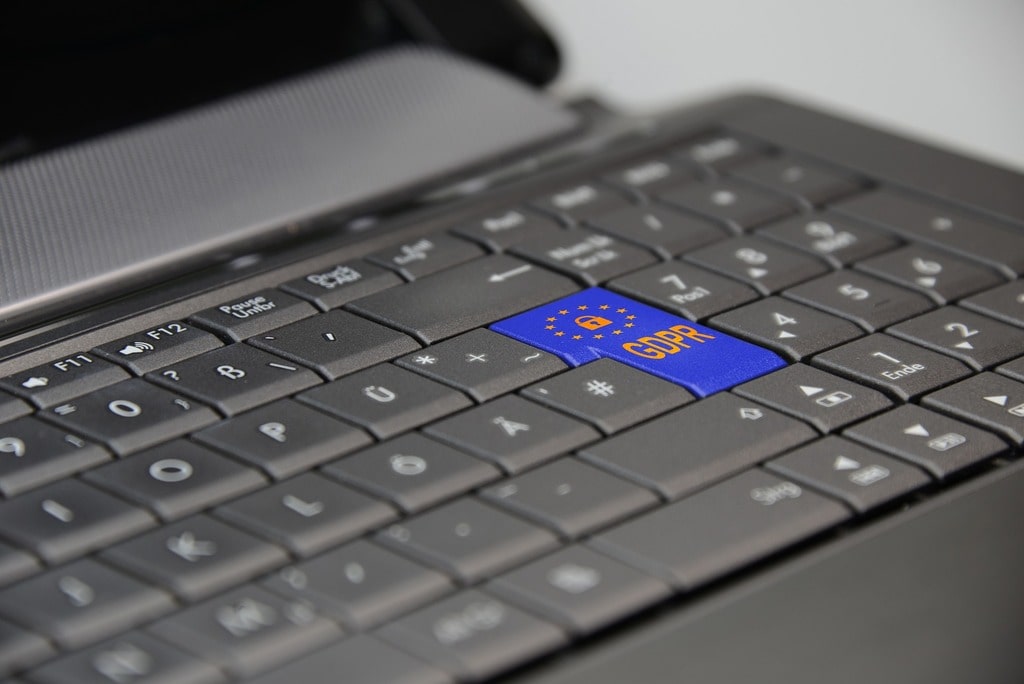
How to make your e-commerce GDPR compliant: our ultimate checklist
Any digital e-commerce processes a huge amount of data daily some of which handles important personal information covering shipping and payment details. Owners of an online business or digital agency would agree with me when I say that analytics data tracking and their analysis are among the most valuable resources to optimise a winning digital strategy.
When tracked with tools like the well-known Google Tag Manager, a user’s navigation and behaviour online can offer precious information that can be translated into an optimisation of a website or an Ecommerce, proposing content, advertising and a navigation experience that better fits their needs.
However, this opportunity comes with significant responsibility. In 2018, the EU passed the GDPR regulation, followed by the Data Protection Act – or GDPR UK – in the United Kingdom, to protect users’ personal information, giving them the power to choose how to handle them.
This means a lot of noise and unclear guidelines, as any website that collects information used to identify users and their behaviour needs to do everything they can to become GPDR compliant and to hold any form of tracking before they get actual consent from the users.
Making your e-commerce GDPR compliant is very important not only to save you from a big fine in case of a data breach but especially to build a relationship of trust with your online customers by showing that you care about their personal information, and that you aim to handle it carefully.
We decided to write this comprehensive and practical guide to explain in simple words the concepts behind GDPR compliance for your e-commerce to help ensure your website is up to date with the current GDPR regulations.
Join us on this journey and learn how to implement the GDPR requirements in simple steps so that you can continue to use e-commerce and improve your conversions with the maximum respect for your customers’ privacy.
Disclaimer: this blog post shouldn’t be taken as legal advice or used as a substitute for such. You should always speak to your own lawyer before implementing this information on your own.
- What is the GDPR Policy
- Do you need a GDPR Policy in your Ecommerce website? Why is it important?
- GDPR Compliance for an Ecommerce
- What are consequences of missing the GPDR Compliance?
- What needs to be GDPR compliant for your Ecommerce?
- How can you make your Ecommerce to be GDPR Compliance? Follow our ultimate checklist
- Conduct a data audit
- Update Privacy Policies
- Take a data documentation
- Implement Data Protection Measures
- Implement a cookie policy/consent mode
- Ensure 3rd party services are also GDPR-compliant
- Update your Terms and Conditions
- Minimise data collection and define roles in your company
- Have a dedicated data protection officer
- Provide a proper GDPR education to your employees
- Being Transparent and letting users take control of their data
- React quickly in case of a data breach
- Remember also to
- Forums, regulations and useful resources
- Conclusion
What is the GDPR policy?
GDPR, an acronymic for General Data Protection Regulation, is a data protection law that the European Union made effective on the 25th of May 2018 replacing the Data Protection Directive (DPD) from 1995.
It defines how personal data should be collected, stored and handled. A similar regulation, the Data Protection Act, was applied by the UK government in 2018 with the implementation of the European GDPR.
With similar requirements, they both offer customers of your e-commerce eight important rights: to be informed, to access, to rectify, to have erasure, to restrict processing, to have data portability, to object, and to make decisions concerning automated decision-making and profiling.
The laws cover both data collected online and offline. Either on a piece of paper or in a digital record, and a wide range of personal information, from the one used to log in to your website to visitor analytics, purchase transactions, and shipping details.
The regulations apply to any kind of physical or digital business, private or public associations, collecting users’ data for their business or their research activities.
The opt-in and opt-out models
This brought on the opt-in model which allows users to give their consent for data to be collected and shared. There is also an opt-out model, which is used in the California Consumer Protection Act (CCPA), wherein consumer consent does not need to be obtained to collect personal information. It only needs to be obtained before the personal information is sold or, in some cases, shared.
Recapping: GPDR compliance applies to all businesses, independent of their location, offering goods or services in Europe or in the UK, or those that have a website collecting personal information from users visiting their website from any of the EU or UK countries. If that applies to your online shop, you then need to do everything you can to make your e-commerce or your domain comply with GDPR.
But how do you know what information is considered personal, and how do you make your e-commerce GDPR compliant?
We know there is a lot to digest, but do not worry, as we will cover everything in the next sections.
What are the other privacy policies to keep in mind?
If you have a website and you want to ensure the complete and safe management of personal information, these are the regulations you should follow:
- The General Data Protection Regulation (GDPR)
- Data Protection Act (DPA)
- The ePrivacy Directive (EU Cookie Law)
- The California Consumer Protection Act (CCPA)
- The California Privacy Rights Act (CPRA)
- The Virginia Consumer Data Protection Act (CDPA)
All regulations have different thresholds and different requirements. If you use cookies to track user data on your website or use third-party applications that use data from your online shop, make sure to create Privacy and Cookie policies that are compliant with all the specific regulations that apply to your E-commerce.
Here at Autify Digital, we use and suggest CookieYes, which not only manages your cookies through a customisable consent banner but also generates the privacy and cookie policy that your business needs, helping your website be compliant.
Do you need a GDPR policy on your e-commerce website? Why is it important?
If you have a website that collects and processes visitor’s data, the answer is yes; you need to implement a GPDR policy on your website.
This is extremely important as it will allow you to handle and manage users’ personal information correctly and as requested by the regulations.
Consumers today care about their privacy more than ever. Even if you don’t fall under any data privacy laws, we believe being transparent with users about what personal data you’re tracking is the right thing to do, as it will create a relationship of trust with your customers, increasing the reputation of your business.
Being GDPR compliant can serve as a differentiator, setting your e-commerce platform apart from competitors who might not prioritise data protection as much. Maintaining GDPR compliance sends a clear message to your customers: their data is safe with you.
You also need to keep in mind that if there was a way to escape financial charges in the past, after the introduction of the GPDR policy, authorities now sanction data sales and mishandling without user permission, regardless of whether it was intentional.
GDPR Compliance for an e-commerce
Compared to other websites online, an e-commerce stores and processes a wider range of private information. Under the GDPR regulations, private information is described as anything that can be used to identify a user directly and indirectly.
Take a moment and think about the extensive list of confidential information we need to share every time we purchase a product online or navigate on social media and the internet:
- Basic identifiers (such as names, email addresses, date of birth, phone numbers, shipping information, card details and more)
- Navigation and remarketing analytics are used daily by digital marketing agencies and experts as an essential source of information to create a winning strategy for your online shop.
- Online identifiers (such as IP addresses and cookie identifiers)
- Other sensitive data (such as biometric data, location data, political opinions, religious beliefs, etc).
There’s much more but we’ll stop here so our heads don’t start exploding.
Since the release of the new regulation in both Europe and the UK, e-commerce stores must abide by the legal requirements of GDPR with severe consequences for the owners who don’t make their websites GDPR compliant.
It is also important for agencies that manage the e-commerce website to adapt the way they collect, use, store and share personal data, so it is compliant with e-commerce GDPR regulations.
I understand this sounds scary, but if you follow our checklist, there is nothing to worry about.
What are the consequences of missing the GDPR compliance?
There are consequences for e-commerce websites that are non-compliant with the GDPR requirements, which could lead to severe penalties.
Of course, there are many aspects to consider, including the magnitude and nature of the data breach, previous records of GDPR infringements and the potential benefits coming from the infringement. The amount of money a company will be fined to pay could be reduced in the case of cooperation with authorities and if they can prove they have ensured the protection of customer data before the breach.
This shouldn’t let you consider taking the risk, as in the worst-case scenario, your company could be fined up to 20 million euros, or 4% of the global annual revenue (whichever is higher).
The financial penalty could come with legal action, too. Customers have the right to sue companies that fail to protect their personal data adequately, which could lead to costly lawsuits and further reputational damage and a lack of trust.
Therefore, it is much better to make a little effort and carefully ensure that your e-commerce and business first meet the correct GDPR requirements.
At Autify Digital, we understand the importance of GDPR compliance for your e-commerce, and this is why we put together this guide to drive you step-by-step through the process.
What do I need to do if there is a data breach?
In case of a data breach, your business needs to notify the relevant supervisory authority within 72 hours of becoming aware of a breach that risks an individual’s rights and freedom. They must also notify affected individuals without undue delay if the breach is likely to result in a high risk to their rights and freedom.
What needs to be GDPR compliant for your e-commerce?
Catching up with all this information can be confusing and overwhelming. Don’t worry as we’ve done the leg work for you and have come up with a list of all the elements you need to ensure GDPR compliance in your e-commerce. These include:
- User profiles: including profiles that users create to sign up to your e-commerce, with personal, shipping and payment details
- Cookies and trackers: used to understand and track user behaviour and preferences, and to provide and analyse the customised shopping experience
- Transaction data: records of purchases, deliveries, returns and customer service interactions
- Feedback and reviews: all the feedback, ratings, and reviews left by the customers about products and services
- Newsletters and marketing data: including data from users who opt-in for newsletters, promotions, and other marketing communications.
How can you make your e-commerce GDPR Compliant? Follow our Ultimate Checklist
Companies and non-profit organisations now have to adhere to strict rules to be GDPR compliant and avoid charges. Now that we have a better understanding of the GDPR regulations and main principles for your e-commerce, we need to make sure your e-commerce meets all the requirements, following the right implementation.
Let’s look at how to make and maintain your website’s GDPR compliance.
Conduct a data audit
This is necessary to understand what kind of personal data you collect and how you store and process them. When dealing with a Consent Management Platform, aka your Cookie Banner and Policy provider, be sure to cover all the tracking and data collection systems active on your website through the scan.
Update Privacy Policies
Ensure your privacy policies are clear, concise, and in line with GDPR requirements. In the Privacy Policy, you must state the information that is being collected and explain the specific purpose of collecting the data and how it is used.
Take a data documentation
Take documentation of what users’ data you store, their type and category, their source, who has access to them, and who you shared the data with.
Implement Data Protection Measures
Use many forms of data protection including encryption, securing your website with SSL, and regular back up of the data. Increase password security for the admin accounts, avoid sending confidential information to third-party services, and use antivirus software to prevent unauthorised access.
Implement a cookie policy/consent mode
Before collecting data in your e-commerce, be sure to have consent from your users. This includes opt-in methods and easy opt-out options within your cookie banner. Make the message in your consent banner clear and easy to understand.
Ensure 3rd party services are also GDPR-compliant
According to Art.6(1B) of the GDPR law, every single service provider of yours should also be compliant. This includes all your service providers (including payment processors and cloud services)
Update your Terms and Conditions
Your Terms and Conditions page should include the basis for data processing.
Minimise data collection and define roles in your company
Minimise the data collection, defining who within the business will have the right to store and collect data. Usually, people who are not in direct contact with customers (customer service, marketing and sales team) should not have access to the database. This also includes creating a company access hierarchy and protecting information with reliable passwords and security systems. Try to collect only the personal information you strictly need for your business and your digital strategy to reduce the risk of data breaches.
Have a dedicated data protection officer
In case your company handle a large amount of data, you should hire or define a DPO who will implement the GPDR policies, oversee how the company deal with them, train the employees on how to process data, and answer questions related to them.
Provide a proper GDPR education to your employees
Educate your employees on the GDPR regulations, so they know the regulations and how to handle personal data.
Being Transparent and letting users take control of their data
Make sure that all communication with your customers is as clear and easy to understand as possible. Do not take shortcuts and let users take control of their data. Users should have the option to request and view the personal information you collect. They also should be able to ask for the change or removal of their data from your website.
React quickly in case of a data breach
If this happens, you should notify your direct supervisor within 72 hours of the incident occurring or has been identified. This needs to be reported to customers and authorities, including the date and time of the incident, what type of data was stolen, and what happened, etc.
Remember also to:
- Ensure secure data storage and transmission
- Conduct regular data audits, reviewing and updating website cookies
- Regularly update your cookie and privacy policies
- Update your documentation again, again and again
- Stay on top of evolving regulations
- Keep your stuff at the best training level
Is this all? Well, yes, but no.
As the owner of an e-commerce or a digital agency that manages an online shop, it is important to understand that implementing the GPDR regulations, i.e. through the Privacy and Cookie policies with a Consent Management Platform, will cause an impact to your digital strategy by changing how and which data analytics are collected, depending on users’ consent.
Analytics tracking systems, such as the well-known Google Tag Manager, can or cannot be cookie compliant as they can include third-party services, and you need to ensure you have user consent before the tracking starts working and the cookies, together with personal data, are collected.
For more information on how to make your tracking with Google Analytics 4 GDPR and Cookie compliant, stay tuned as we will soon publish our next blog post here and on our social channels
Forums, regulations and useful resources
- GDPR.eu: a comprehensive resource offering GDPR guidelines, news, and best practices, including useful FAQs to cover all your doubts about the topic.
- Information Commissioner’s Office: similar to GDPR.ue, it offers guidelines and best practices for the GDPR regulations in the UK.
- Ecommerce Europe: provides various publications, webinars, and guidelines tailored to GDPR in the e-commerce sector.
- Data Protection Network: A community-driven platform where professionals discuss GDPR topics, share insights, and offer guidance.
- The General Data Protection Regulation (GDPR)
- Data Protection Act (DPA)
- The ePrivacy Directive (EU Cookie Law)
- The California Consumer Protection Act (CCPA)
- The California Privacy Rights Act (CPRA)
- The Virginia Consumer Data Protection Act (CDPA)
Conclusion
Nowadays, data collection, tracking and analysis are crucial for e-commerce’s to optimise their website and drive the most traffic from their digital strategy.
GDPR compliance for any e-commerce is crucial not only to protect the data of your customers and avoid fines but also to gain your customers’ trust by showing that you take their privacy seriously.
Make sure you follow these guidelines carefully to make your e-commerce GDPR compliant while protecting your customer’s personal data.
If you need further assistance with your implementation or with any other SEO or digital services, visit our Contact Page and get in touch with us.
Post navigation
Read More Blogs

Amad Tababa named as One to Watch in The LDC Top 50 Most Ambitious Business Leaders for 2024
We’re very excited to announce that Amad Tababa, Founder of Autify Digital,

SEO vs PPC: Which Works Best For Jewellers
Did you know, 75% of online search engine users never make it past the first





